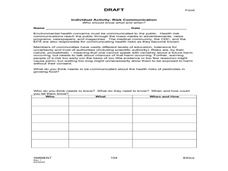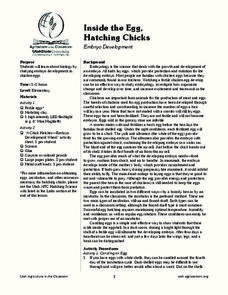Curated OER
How is Your Food Grown
Students consider how their food is grown due to pesticide use. They reflect on the harm done to the various groups, then discuss the ethical questions from the perspectives of different stakeholders. IN addition, they compile relevant...
Curated OER
My Pyramid
In this food pyramid worksheet, students read about the servings recommended for food group and tips about staying healthy. Students can also write their food choices for a day. The worksheet also includes a letter to the family and...
Curated OER
Reading: The Mayans 1
For this reading comprehension with glossary worksheet, students read a passage about the Mayan civilization and the accompanying glossary and illustrations, and then identify true statements from the reading and by inference. Students...
Curated OER
Planet Zorcon
Students relate the geography and economics of Utah. In this geography instructional activity, students log their use of resources both natural and synthetic. Students participate in an experiment to understand how the Earth will be in...
Curated OER
Seventh Grade Social Studies Quiz
In this Georgia social studies assessment activity, 7th graders respond to fifteen multiple choice questions based on seventh grade social studies skills.
Curated OER
Celebrate Sunflowers
Students skip count with sunflower seeds. In this interdisciplinary lesson, students discuss the history of sunflowers. Students count by 1's, 2's, and 10's with bags full of sunflower seeds.
Curated OER
Introduction to Welding
Students explore how to weld and the safety procedures that are in place. In this welding lesson plan students take a safety test on welding and once they know all the rules they use the angle grinder.
Curated OER
How much is Dirt Worth?
Students problem solve to understand the value of the Earth's soil. In this value of dirt lesson, students understand how much of Earth is made of dirt and how important to our survival it is.
Curated OER
The Trail of a Snack Food
Students identify some of their favorite snack foods. Using this information, they discover the resources needed to produce the food. In groups, they research different alternatives to make their favorite food in order to protect the...
Curated OER
Modifying Viscosity of Egg Yolk
Students investigate the effects of substances on the viscosity of egg yolks. In this viscosity lesson plan, students separate egg yolks from their albumen and then add different masses of albumen back to each egg yolk. They measure the...
Curated OER
Sorting
Students experience sorting. In this organization lesson, students play a computer sorting game called "Flood Game" on the "Between the Lions" website. Students visit a library and observe and discuss book organization. Students work in...
Curated OER
The Quicker the Better? Food Processing
Sixth graders evaluate the nutrition of various foods. In this healthy eating lesson, 6th graders discuss the processing of many common foods and what this means. Students identify and research unfamiliar ingredients in processed foods...
Curated OER
Barter Day
Fourth graders understand the process of bartering. In this barter day lesson, each student barters an item in their desk with another student. All items are returned at the end of the activity and it is important to tell the students...
Curated OER
Corn: An A-maizing Plant
Students explore the corn crop. For this farming lesson, students identify which states are in the corn belt and read about the history of corn, its uses and its development and growth. Students dissect a corn kernel. Students discuss...
Curated OER
Map Skills
Students create two types of maps. In this map skills lesson, students discuss map vocabulary and view maps of Florida. Students draw a free hand map of Florida and include major cities, bodies of water and land forms. ...
Curated OER
Great Balls of Fire
Sixth graders compare and contrast natural and synthetic fabrics. In this science investigation lesson, 6th graders test the flammability of 6 natural and synthetic fabrics.
Curated OER
Track the Path of Coffee From Farm to Store Shelf
Learners investigate the cultivation and marketing of coffee. In this global studies lesson, students consider the connections of the 21st century world as they explore how coffee makes it from farms to their homes. Learners consider the...
Curated OER
Making Paper
Students explore paper making. In this cross curriculum multicultural ecology and art instructional activity, students follow written and oral instructions to make paper using common household items. Students predict the amount of paper...
Curated OER
Where Does Food Come From?
Students recognize that food we eat comes from farms. In this where does food come from lesson, students discuss planting crops and how they grow. Students plant seeds for edible crops and eat them when are ripe. Students...
Curated OER
Inside the Egg, Hatching Chickens
Students explore how an egg becomes fertilized. In this biology lesson, students "candle" a variety of eggs in order to determine which ones have been fertilized and which ones haven't. Student use paper plates to create a graphic on the...
Curated OER
Recognizing Trade Definitions and Concepts
Learners differentiate between imports and exports and examine data related to international trade. They view and discuss a PowerPoint presentation about international trade, define key vocabulary terms, answer discussion questions, and...
Curated OER
Stick To It!
Students compare different types of pressure sensitive adhesive tapes. They fevelop and carry out tests for variables affecting the force needed to peel tape off a surface. Students analyze the time needed to peel the tape with different...
Curated OER
The Living Corn Necklace
Fifth graders generate two types of corn seeds, Dent corn and Indian corn to compare the similarities and differences of each of the seedlings. The preferred seedlings are determined through observations made by Students.
Curated OER
American Indians of the Local Region
Students describe the American Indian nations in their local region long ago and in recent past. They research religious beliefs, customs, and various folklore traditions.























